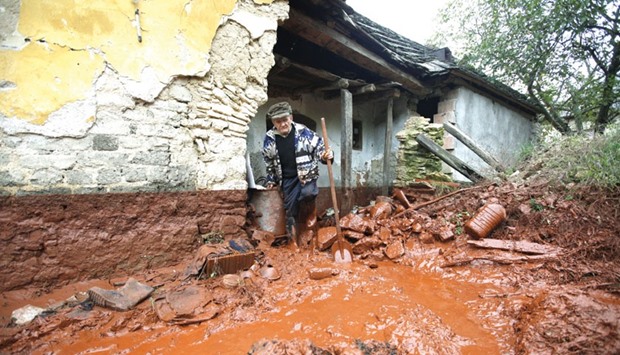
This October 6, 2010 file picture shows a man trying to clean up his house in the village of Devecser, Hungary, which had been hit by toxic sludge.
Fifteen people tried in connection with a toxic spill from an alumina reservoir in western Hungary that killed 10 people in 2010 were acquitted yesterday, an outcome that a local mayor said would only serve to further traumatise and anger residents.
The spill was one of Hungary’s worst environmental disasters.
Toxic red mud flowing from the reservoir destroyed hundreds of homes across three towns, covered the countryside and seeped into rivers as far downstream as the Danube.
It took years to clean up at a cost of about 40bn forints ($140mn).
MAL Corp, the aluminium smelting company that owned the faulty alumina reservoir was subsequently taken over by the government, which declared it responsible for the incident and began to close it down.
The company is still under liquidation.
But in a first instance ruling, the court in the western town of Veszprem said executives and top employees of MAL had not been criminally negligent, nor had they committed other crimes they were charged with during the 40-month legal procedure.
“The defendants had no realistic and objective opportunity to discover the hazards that had formed,” the court said in a statement, adding that relevant authorities had signed off on the reservoir’s blueprints and operation, and conducted regular checks.
“The authorities had uncovered no shortfalls and prescribed no additional checks. The catastrophe had no predictable, visible, recognisable prior sign,” the court said.
It was not immediately clear whether prosecutors would appeal the verdict.
Earlier, a local far right politician, Lajos Kepli, protested in the court, holding up a sign showing an image of the devastation.
It read: “Is this the worth of 10 lives?”
He was led out by police, a Reuters witness said.
Karoly Tili, the mayor of nearby Kolontar, the first village that was struck by the sludge, said the locals, many of whom had yet to recover from the disaster, would be devastated.
“I am disappointed,” he said by telephone. “I thought they would set an example in the case. The prosecution needs to appeal this, or people here will be very angry.”
Emotions in Kolontar were running high ahead of the trial.
On Wednesday, Jozsef Holczer, 67, whose house was destroyed, cried as he recalled the tragedy which swept away half the buildings in the village.
“I used to come here to sit with my friend Erno Stumpf under a big walnut tree that stood here,” Holczer said. “We would hide from the sun in summers, take shelter from the snow in winters, sit around and drink and talk.”
Stumpf and his sister died trying to save their pigs from the mud, the old man said.
